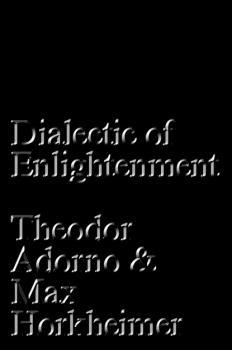ТОП просматриваемых книг сайта:
Theodor Adorno
Список книг автора Theodor AdornoАннотация
No other country and no other period has produced a tradition of major aesthetic debate to compare with that which unfolded in German culture from the 1930s to the 1950s. In Aesthetics and Politics the key texts of the great Marxist controversies over literature and art during these years are assembled in a single volume. They do not form a disparate collection but a continuous, interlinked debate between thinkers who have become giants of twentieth-century intellectual history.
Аннотация
Theodor Adorno and Max Horkheimer wrote the central text of “critical theory”, Dialectic of Enlightenment, a measured critique of the Enlightenment reason that, they argued, had resulted in fascism and totalitarianism. Towards a New Manifesto shows the two philosophers in a uniquely spirited and free-flowing exchange of ideas. This book is a record of their discussions over three weeks in the spring of 1956, recorded with a view to the production of a contemporary version of The Communist Manifesto. A philosophical jam-session in which the two thinkers improvise freely, often wildly, on central themes of their work—theory and practice, labor and leisure, domination and freedom—in a political register found nowhere else in their writing. Amid a careening flux of arguments, aphorisms and asides, in which the trenchant alternates with the reckless, the playful with the ingenuous, positions are swapped and contradictions unheeded, without any compulsion for consistency. A thrilling example of philosophy in action and a compelling map of a possible passage to a new world. This new edition contains two texts on needs by Adorno and Horkheimer that have been translated for the first time or have been difficult to access.
Аннотация
A classic of twentieth-century thought, charting how society devours itself through the very rationality that was meant to set it free Theodor Adorno and Max Horkheimer are the leading figures of the Frankfurt School and this book is their magnum opus. Dialectic of Enlightenment is one of the most celebrated works of modern social philosophy and continues to impress in its wide-ranging ambition. Writing just after World War II and reflecting on the bureaucracy and myths of National Socialism and the inanity of the dawn of consumerism, Adorno and Horkheimer addressed themselves to a question which went to the very heart of the modern age: ‘why mankind, instead of entering into a truly human condition, is sinking into a new kind of barbarism’. Modernity, far from redeeming the promises and hopes of the Enlightenment, had resulted in the stultification of mankind and administered society, characterised by simulation and candy-floss entertainment. Tracing humanity’s modern fall to the very rationality that was to be its liberation, the authors exposed the domination and violence that underpin the Enlightenment project.




